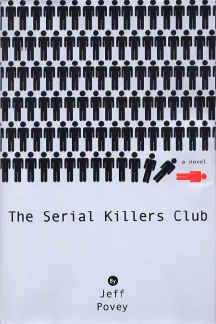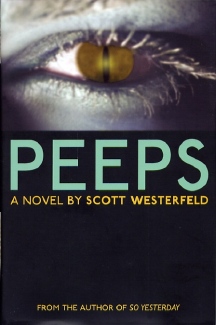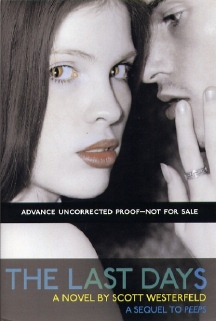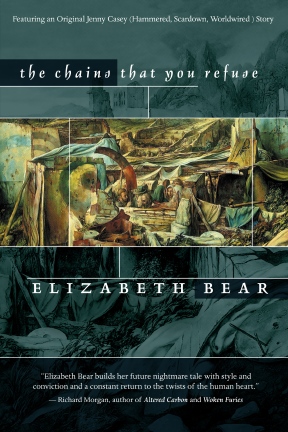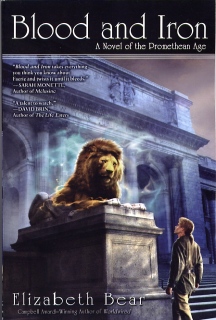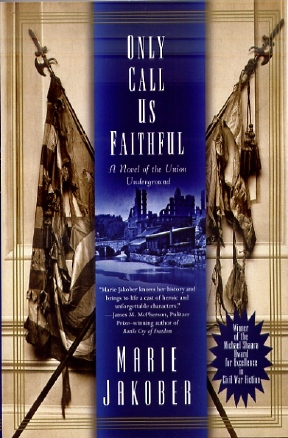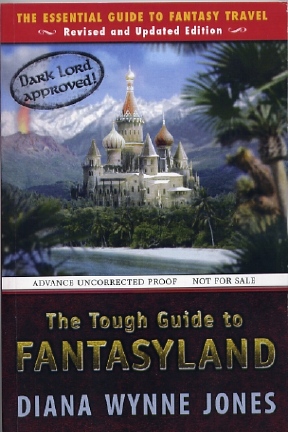|
|
|
This Just In...News from the Agony Column
|
06-16-06: Jeff Povey Joins 'The Serial Killers Club' |
|||
A
Bloody Good Time
Well, in fact, yes, that proves to be the case. Povey's got a light touch, a short book and a premise that if not totally original, is, at least handled with some panache. When the notorious serial killer Grandson-of-Barney decides carve the heart from a dockyard stevedore, he doesn't realize that he's misjudged the muscles on Our Hero until it's too late. Our Hero does what anyone in his position would do. He ships the body off in a container to South Africa, thence no doubt to end up in a vanity at Home Despot. But not before going through Gobby's wallet. Our Hero continues his series of understandable decisions. He takes on Gobby's identity (who wouldn’t steal the identity of a serial killer if they had the chance?) and then the fun really begins. Because Gobby's about to become part of The Serial Killers Club. These chummy types meet-and-greet, compare notes and each takes on the name of a famous actor. Thus Our Hero completes his transformation into Douglas Fairbanks, Jr. Just one little problem. He's got to live up to the whole serial killer deal, and he's not a killer, really. Gobby was an accident! But new shoes call for new steps. So Dougie decides to kill off only the most deserving, that is, his fellow club members. And as the novel really begins, he hooks up with Agent Wade of the FBI who totally approves of what he's doing. Your government dollars at work! Your response on the humorometer is going to run the gamut from a smirk, to a snicker to a phhht! to more than a few earnest, earned out-loud laughs. Povey knows how to keep things rolling, and knows that he should only keep things rolling for some 278 or so pages. Well accustomed to the attention-deficit-disorder generation from his work for TV, Povey keeps things short, sharp (this is a serial killer novel!) and snappy. Clever titles for mini-chapters, and a series of killings (this is a serial killer novel!) that are clearly inspired more by Rube Goldberg than Hannibal Lector. The kind of good, clean fun that often kicks off a series. And in fact that whole good clean fun thing works out to be one of the nicer aspects of this novel. It's by no means a horror novel, and other than the high body count, you could probably sell it as YA fiction. Povey knows how to be generous with his characters, which is pretty damn critical when most of your characters are bloodthirsty killers. But these aren't creepy or embarrassing serial killers. They’re the kind of serial killers who would probably make their parents proud. (If they weren't mummified in the basement.) Still, it's a pretty interesting skill to seamlessly write a novel in which every character is a murderer you might like to get to know. And as for forensics, well think of this as a sort of reverse CSI. Now, 'The Serial Killers Club' is not going to someday make it into the "Suggested Reading" list for grades K-12, though it would probably get a much closer read than 'Silas Marner'. (We love to pick on 'Silas Marner'.) But Povey's crime-fiction satire is pretty funny. It's as engaging as a novel in which a character called Cher gets a portable TV chucked at her can be, and that's pretty darn engaging. It's engaging in the way that only a novel in which characters' feet literally catch on fire can be. Yes, the apocalypse may be around the corner. Or it may already have come to pass. Should you be wrapped up in 'The Serial Killers Club', you might not even notice those trumpets, the angels, any of it. La, la, la. Serial killers are so amusing! |
|
06-15-06: Scott Westerfeld's 'Peeps' Live For 'The Last Days' |
||||||
Children
of the Night
Yes, it's the old parasitic vampire story, reborn in present day New York as a sort of slow-mo epidemic that strikes, not surprisingly, the young. So, sure, the whole "youth is great" thing is perhaps a bit exaggerated, you know, the edges blurred by the years gone by. No worries, Westerfeld's tale of parasites, infection and detection will sharpen those edges till they bleed. 'Peeps' begins when Cal, a young biology student, meets a gal named Morgan. Before you can say "condom", he's a peep, parasite-positive. And this parasite has some pretty deleterious effects for your social life. Assuming of course that insane cannibalism is a problem. Photophobia. Cruciphobia. Sounding familiar?
I can't say much about 'The Last Days', other than that it lives up to the first book in the series and that you should avoid it like the plague until you've read 'Peeps'. Music gets more of a workout here, so if you like your new vampire novels with extra bass, drums and guitar, then know that you're in for some heavy-duty improvisation. And that carries over to what happens, which is wilder than any jam session you've ever heard or are likely to hear. Suffice it to say that that one problem of series fiction is escalation. Easier said than done, but Westerfeld carries it off with an ease that belies the difficulty of what he's managed to accomplish. The bottom line is that yes, you will have to hie yourselves hence over to the YA section of the store, but don't be embarrassed. It's not teenagers who are turning a British schoolmarm's series into an international bestseller. And it won’t be teenagers who turn Scott Westerfeld's series into a spec-fic bestseller. I suppose that all of us spec-fic readers are sort of vampires ourselves, unwilling to "let go" of youth's monsters and strangeness. We may not live forever, but we don’t feed off the living either. We feed in the bookstores. Our parasites have pages. |
|
06-14-06: Elizabeth Bear Draws 'Blood and Iron' |
||||||
Hard
Fantasy for Hard Times
Unless Bear confesses to some scientific expertise or an extra-terrestrial heritage, I'm going with the latter explanation. Yes, I've known about 'The Chains That You Refuse' for a while now; you might have noticed it in the Rolling Shelves. And I've known all about her wide range of writing for some time now, having read enough of her work in Interzone. But talk about bargains. Here's Night Shade, once again going up against New York and showing them a thing or two, or rather a thing or twenty-two, in this case, short stories. From the variety here, I should have been more prepared for 'Blood and Iron'. I mean, you've got Ginsberg in the afterlife and Niels Bohr and Schroedinger's Cat, the company of four riding through faerie, I mean, pretty much the whole canvas of what shall we call it -- weird fiction, speculative fiction, science fiction, horror, dark fantasy, slipstream, New Weird, fantasy, ----ed-up strangeness? Whatever! Call it: stuff by Elizabeth Bear, buy it, end of story. It's shipping. You get yourself a Night Shade trade paperback for fifteen bucks and call yourself very lucky. A decent book, not one of those monstrous new mass market paperbacks that looks bigger, costs more, won’t fit in your pocket and still reeks of cheap. No, this is quality fiction, from here to eternity, but without the eternal price to pay. Well, except for the fact you're going to heck for even thinking of reading such strange literature and thinking of it as literature. So be it. Books of the damned, we've already got 'em. I'll always take another. Life, refusing to make things easy, offers up another in the form of Bear's latest novel from Roc / Bantam Spectra. And given a title of 'Blood and Iron', you would be forgiven (though still damned for reading books of the damned) for thinking that Bear was following on the lead of her first three hardish-SF paperbacks. Well, you'd be wrong. 'Blood and Iron' is something completely different. Well, except that it too uses mystery tropes, and is particularly well-written. But the milieu here is nearly the polar opposite of the 'Worldwired' trilogy. What you get is a present-day secret history. Behind the scenes, for centuries, human mages who call themselves the Prometheus Club and supernatural critters who go by the dependable moniker of "Faerie" have duked it out behind the scenes. Our history, humankind's, is just the front page for the backstory of infighting between two types of nasty. Sure enough, someone, something, comes along that can tip the balance in one direction or another. A Merlin, these backroomers call her, and yes, it's a her, well as much a her as one can be when one is, not to put too fine a point on it, pure magic. The astute reader of speculative fiction can see how this will put a crimp in the plans of both sides. Now they have to give up their comfortable battle-as-truce and go for it, or rather her. And the astute reader can also quite well understand that she will have a mind of her own and not be easily swayed to do anything for anyone.
Subtitled 'A Novel of the Promethean Age', 'Blood and Iron' as surely starts a series of sorts as it does tread lightly but with agility through any genre label you’d care to apply. Bear works out her background with the detail-orientation of a science fiction writer, spins her prose like veil-dancing fantasist, and never forgets to keep an iron fist in that velvet glove. Good monsters, good characters, enough of an ending to leave you satisfied but wanting the more that is clearly promised; what more can you ask? Timely sequels, but Bear has already demonstrated that ability. If you've been following her blog, you've already known about this one for longer than this. I'm just here, then, to tell you, "Go forth and buy." And as you buy, witness the evolution of Bear. Starting in the great periodicals, she slipped onto the bookshelves with mass-market paperbacks. Round one, she must have sold well enough to step up to round two, with these excellent trade paperbacks. One wonders how the biz will evolve with Bear. To my mind, any of these would have made buyable hardcovers. I'd have felt rewarded. But Bear's editors and publishers seem to know what they’re doing. If you're looking for a series of science fiction MMPBs to take to the beach this summer, you've got her 'Worldwired' books. And now two more, slightly larger books. Well, 'Blood and Iron' is pretty thick at 430 pages. Not doorstop thick, though, and that's nice. Always good to see a series started that isn’t like, daunting. No, don’t be daunted. Be haunted. Get into Bear's peculiar worlds. Science fiction, fantasy, whatever; they're books, you buy 'em and read 'em. Shelve them, save some space. Because there will surely be more; and you'll want to read those, as well. |
|
06-13-06: Marie Jakober's 'Only Call Us Faithful' |
|||
Union
Spies and Genre Ties
Then. Well, then curiosity got the best of me, because I was wondering just what the heck the book was. I mean, was it non-fiction, was it just fiction, or was it some alternative history? My money was on the last, given the publisher. Forge is the slightly-more-mainstream brother imprint to Tor. The novel calls itself "A Novel of the Union Underground". I knew about the underground railroad, but the union underground? Well, a consequence of disinterest in a subgenre is utter ignorance of all things concerning said subgenre. But now I was sort of hooked. It seemed that this novel had won the "Michael Shaara Award for Excellence in Civil War Fiction", what ever that was, presumably an award for excellent fiction about the Civil War, no? Curiouser and curiouser. Well, my money, as noted above, was on the alternate history pick. I thought, "Well, maybe the Union Underground is something out of alternate history. Yikes and yuck." You see, while I enjoy lots of alternate history titles, Civil War alternate histories generally annoy me. It all seems too pat, too easy. It's as if the Civil War is a sort of singularity for the alternate history genre, and it sucks in everything around it. And I admit there's a sort of distaste I experience since so many people seem to want to actually live in the alternate histories that to me seem horrifically dystopian. But back to the book, well, what the hell was it? Muddling through the back cover it still seemed to be on the alternate history side. Elizabeth Van Lew, born in Richmond Virginia, not sympathetic to the Confederate States once they seceded. So, she begins her life as a spy. Wait just a minute. This doesn't sound too alternate history. It sounds...read some more...wait, this is fiction based on a real person. She's a spinster in the South and she's a union spy! What just happened? Did I find something in the Civil War interesting? Oh well, time for another rule to get broken. Suddenly this novel that was about to be moved pretty much touched to the OUT box, got shuffled to the IN box. And it got a closer look. Narrated by Van Lew's ghost, in part, 'Only Call Us Faithful' looks to be a fascinating tale of domestic spying and counter-terrorism. The prose is rich, the switch from the supernatural POV's to the pure historical fiction portions gives the novel a very nice three-dimensional feel. The story is both gripping and important. And true. So I guess I can be OK with Civil War fiction, provided it's, like good and tells me something I knew utterly nothing about. This is well beyond any history books that were ever shoved in front of my face and, come to think of it, had this one been shoved in my face, I'd probably be a lot more inclined to give the Civil War fiction genre a try. This might be the only book of its type I'm ever interested in, but that does nothing to dim my interest. That said, there is a lesson to be learned here. That being why people are so easily put off the kind of genre fiction that I enjoy. I can see that many folks having seen or read one or more really bad science fiction novels might look at the rest of the genre as if it is a homogenous blob of badness. I thought that the cover of 'Only Call Us Faithful' was rather deceptive at first, but it's perfectly appropriate. I just wasn't familiar with the signals. I mean, how does the novice, the complete SF&F virgin, tell the difference between a China Miéville novel and say, Volume X in a Series of ZZ? If your default reaction to SF&F was "Yuck!" or "Yikes" you might very well miss a lot of great fiction. The answer here is simple. Force yourself to open up books that are out of your normal comfort zone. Read them. Breathe. Read more. Take notes and leave no prisoners. Lots of what you don’t like probably is either crap not worth liking or something good that is simply not to your taste. I might have classified 'Only Call Us Faithful' as "good, but not to my taste". But all I had to do was wrench round my prejudices and see it as a sort of crime novel. Here's a real-life spy, having her groceries searched. Who care about the time period? I'm just hoping that nobody starts searching my groceries for hidden messages, because they'll certainly find them. |
|
06-12-06: A 2006 Conversation With Gary Shteyngart ; Diana Wynne Jones Offers 'A Tough Guide to Fantasyland' |
|||
"We're all living in Absurdistan"
Shteyngart is just as funny in person as he is in print, and if you've even picked up 'Absurdistan' and glanced at it, you know that's don't-drink-milk funny. When we spoke, I was flabbergasted to find out just how much of 'Absurdistan' is based on experiences he actually had while traveling to "the 'stans," as he called them. As one might expect in a novel that begins with a hilariously graphic circumcision, our conversation often veered into non-radio-safe, non-work safe territory, so you should consider yourselves warned. We talked for over an hour, and because Shteyngart is so breezy, so funny, I decided to post the whole interview in one big blob in both MP3 and RealAudio formats. But be aware. Once the tape starts unrolling, you’re going to spend a lost hour in Absurdistan yourself. And afterwards? Well, whether you're listening in Santa Cruzistan, Bostonistan, or Londonistan, be prepared. Our world is a world of 'stans. |
|||
"No one ever wears SOCKS."
So what exactly is 'The Tough Guide to Fantasy'? It's a dictionary of every cliché in fantasy, heavily cross-referenced. Each term in the guide that has a DEFINITION is in CAPS. So if you see a word in a DEFINITION in CAPS, then you know that you'll be able to look up that word and determine its DEFINITION. It includes a handy page of IDENTIFICATION ELEMENTS, sort of generic road signs that indicate something is, say an Animal, or a Cliché. They go easy on that last one, because, sort of by DEFINITION, everything in the Guide is a Cliché. I have a deep personal love for these light-hearted fictional-non-fiction books, and once you twig to their existence, you realize that there are more of them than you’d expect. The real question that arises is: Who is going to actually read one of these beyond those standing in the bookstore seeking a quick chuckle whilst the other half picks up the latest Sue Grafton mystery? That's a good question that will eventually get a good answer. Let's start with this particular guide, and more importantly, this particular author. Jones is a clever, smart writer, clever and smart enough to have her novel 'Howl's Moving Castle' snagged by Studio Ghibli to be adapted by Hayao Miyazaki. If you haven’t seen this movie, then be assured that it is one of the very few well worth your valuable time. Beyond the gorgeous animation, 'Howl's Moving Castle' is the oh-so-rare genre film that is based on a great story from Jones' novel. Such a strange thought, that a genre film needs a good story. And Jones has them by the boatload, with 48 titles listed in the front of this one. So, who is going to actually read this book? Part one: Jones is an excellent writer, and here is more of her writing. For those who think that there is not a story here, that's not exactly the case. The "How to Use This Book" that begins the books suggests a sort of self-guided tour to the clichés of Fantasyland. You're to use the map, find the start point, then step directly from one cliché to another, essentially creating your own story as you take a tour of every tired trope that has ever been between the covers of a book with dragon, an elf or a wizard on it. You can leap from DEFINITION to DEFINITION, and if say, you encounter a phrase in all caps like GNOMIC UTTERANCES that you don’t understand, you jump to that definition. (GNOMIC UTTERANCES, paraphrased by YT are the kind of fortune cookie crap that you find as chapter headers in the cliché fantasy, or are uttered by SAGES. Don’t know what the Fantasyland cliché definition of SAGE is? Well, you're in the right book.) So, who is going to actually read this book? Part two: someone looking to read a piss-take "build your own adventure" fantasy, IE, an RPG player. [Ducking emails.] Then of course there is the novice fantasy reader. Let's say for example, that you saw Lord of the Rings and having experienced multiple endings, you still want to read the genre. Pick up a book that looks good to you, tuck up and then keep this book to hand to see why Tolkien is a Classic and so many other things are just well, the other 99%. So, who is going to actually read this book? Part three: novice readers wanting see why everyone is always eating STEW. Finally, for those who cannot be convinced to stop by stink bombs and spouses, you can use the Guide to help you avoid at least a couple of clichés when you strike out in the crowded territory of writing fantasy. The fact of the matter is that if you were to use this book as a filter and run the racks of fantasy at the average chain bookstore though that filter, you'd get about one novel in a thousand out the other end. That's why Jones could even write this, and why anyone who is thinking of writing a book needs this book, like now. In a sense, it becomes a horror novel, one in which the writers are the monsters. And isn’t that ever the case? |
